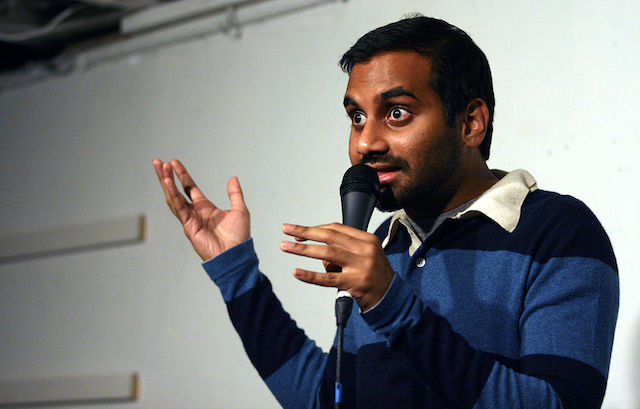Today I took the time to read the whole episode involving a woman nicknamed “Grace” and the famous actor and stand-up comedian Aziz Ansari.
I confess that I only read it after seeing many people questioning Grace’s intentions, calling her “dangerously powerful.” Apparently, she shouldn’t have come forth with her story because, well, “it wasn’t that bad,” and Ansari had apologized.
On the one hand, I understand that yes, he apologized. I even believe that Grace would have been better off sharing the way she’s been coping with her trauma to a therapist. On the other hand, I see it as an opportunity to discuss the nuances surrounding the case, namely our notions of consent.
I grew up witnessing adult women around me dealing with outrageous, nasty behaviours from their men—but much to my astonishment, they’d always finish off their ventings with stuff like, “Well, it could be worse…at least he never beat me up.”
The definition of “good” was, in other words, a man who didn’t spank or hit his wife.
Now as I go through the comments around Ansari’s behavior, I see the same line of thinking at work:
“He wasn’t as bad as the others!”
“He apologised, what else did she want?”
“It could have been worse!”
All that along with the usual, good ol’ victim blaming of, “Why did she drink? Why didn’t she say no before it escalated?”
While consent is clearly part of it, I believe the real issue here runs deeper than that. So, if this isn’t merely about consent, what else is it, then? I’d like to invoke the book Women Who Run With The Wolves by Clarissa Pinkola Estés to help explain that the story of Grace and Ansari is about our collective loss of touch with our wild selves.
Before I go ahead with my reasoning, let me explain that Estés does not use the word “wild” to mean “out of control” or “uncivilized.” Rather, she uses it to describe someone who lives a natural life, in perfect harmony with healthy boundaries and a deep sense of integrity.
I thought of that “wild self” the moment I laid my eyes on Grace’s story. Because it felt too familiar. I could be wrong, but I believe the story broke not just because it’s about a famous celebrity like Ansari, nor due to the fact that the #metoo campaign gained excessive traction and is now arguably out of control, ending up on a “witch hunt” of sorts. No. I honestly feel the narrative resonated because it is, in a way, the story of countless women.
When people say that Ansari was not that bad, I unfortunately agree with them, but not because I view what he has done as something “normal.” I see it as us being so far removed from our true wild selves that we have been deluded into believing actions such as Ansari’s are not condemnable, after all. We do not see his behaviour as predatory, simply because there’re worse things happening to women in this world—and that’s precisely where the problem lies.
As Estés writes, “All creatures must learn that there exist predators. Without this knowing, a woman will be unable to negotiate safely within her own forest without being devoured. To understand the predator is to become a mature animal who is not vulnerable out of naivete, inexperience, or foolishness.”
What exactly places us in this position of extreme vulnerability? Well, it’s a widespread rape culture harnessed by the patriarchy, with people not having a clear idea of what boundaries and consent really mean. But sadly, it’s also a product of the general understanding that something should be admissible just because “it wasn’t that bad.”
As Estés puts it, “(Young girls) are taught to not see, and instead to “make pretty” all manner of grotesqueries whether they are lovely or not…This early training to ‘be nice’ causes women to override their intuitions. In that sense, they are actually purposefully taught to submit to the predator.”
This was very clear to me when reading Grace’s account—and it was familiar, too, as I’ve been there, a few times. It’s ironic, but our civilization’s “progress” was made at the expense of our own self-awareness. And this needs to change.
How do we do this? I think the first step would be to acknowledge that the problem exists. I’ve seen many articles picturing Grace as a silly young woman who should have known better. The thing is, if we consider the way we are brought up, and the amount of effort that’s put into us being docile and empathetic, it is not difficult to understand what went on in that apartment.
As for Ansari: yes, he needs more clarification on what consent means, including the dreaded non-verbal cues. I do not think his career should be destroyed. It’s about time we realize there’s no such a thing as perfection. But I do think that giving Ansari a pass just because he was nicer than most guys who exhibit predatory behaviors in their intimate lives is probably not the wisest move, either.
We need to do better, and I think that collectively, the #metoo movement still has the power to be just that: a long overdue attempt to improve our coexistence on this planet.
~
~
Author: Flavia Simas
Image: Wikimedia
Editor: Callie Rushton
Copy Editor: Kenni Linden












Read 16 comments and reply